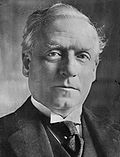6 December 1923 | |||||||||||||||||||||||||||||||||||||||||
All 74 Scottish seats to the House of Commons | |||||||||||||||||||||||||||||||||||||||||
|---|---|---|---|---|---|---|---|---|---|---|---|---|---|---|---|---|---|---|---|---|---|---|---|---|---|---|---|---|---|---|---|---|---|---|---|---|---|---|---|---|---|
| |||||||||||||||||||||||||||||||||||||||||
 Results of the 1923 election in Scotland for the county and burgh seats Unionist Labour Liberal | |||||||||||||||||||||||||||||||||||||||||
A general election was held in the United Kingdom on Thursday 6 December 1923, [1] and MPs were elected to represent all 74 seats in Scotland. [2] Scotland was allocated 71 territorial seats (32 burgh constituencies and 38 county constituencies) [d] which voted using the first past the post voting method, and one university constituency, which elected an additional 3 members using the Single Transferable Vote (STV) method. [3] As voters in university constituencies voted under a different system, and in addition to their territorial vote, the results are compiled separately.
Contents
- Results
- Seats summary
- Burgh & County constituencies
- University constituency
- Votes summary
- Notes
- References
The election saw the Labour Party make further gains following their success in the previous election in 1922, winning 34 seats in total. The Liberals, who had reunited following the split caused by the continuation of the Wartime coalition, came in second on 23 seats, down five from the previous combined total for their two former factions. The Unionists gained a seat, finishing third on 16 seats. Although Labour won a plurality of seats in Scotland, when combined with results from across the UK, the Conservatives (with whom the Unionists aligned at Westminster) led by Prime Minister Stanley Baldwin, won a plurality in the House of Commons. The conservatives were however, well short of majority, with both Labour, led by Ramsay MacDonald, and H. H. Asquith's reunited Liberal Party gaining enough seats to produce a hung parliament. MacDonald formed the first Labour government with tacit support from the Liberals. Rather than trying to bring the Liberals back into government, Asquith's motivation for permitting Labour to enter power was that he hoped they would prove to be incompetent and quickly lose support. Being a minority, MacDonald's government only lasted ten months and another general election was held in October 1924.
The Communist Party lost their only Scottish seat in Motherwell. The Scottish Prohibition Party retained their only seat in Dundee.


